WHAT WE DO
EMPOWERING PEOPLE TO MEANINGFULLY CONNECT AND LEND SUPPORT
R U OK? is a national suicide prevention charity and registered public health promotion that encourages people to stay connected and have conversations that can help others through difficult times.
Our work focuses on building the motivation, confidence and skills of the help-giver – the person who can have a meaningful conversation with someone who is struggling with life.
R U OK? contributes to suicide prevention efforts by encouraging people to invest more time in their personal relationships and building the capacity of informal support networks – friends, family and colleagues - to be alert to those around them, have a conversation if they identify signs of distress or difficulty and connect someone to appropriate support, long before they're in crisis.
THE R U OK? VISION, MISSION AND ROLE

OUR VISION
A nation where we are all connected and protected from suicide.

OUR MISSION
To inspire and empower everyone to meaningfully connect with those in their world and lend support when they are struggling with life.
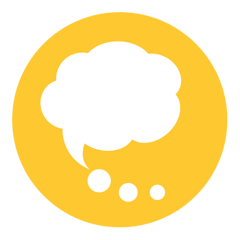
OUR ROLE
To support people living in Australia to develop the confidence and capability to be a help-giver to the people in their world through conversations and connections.
R U OK? TALKS TO THE HELP-GIVER
R U OK? contributes to suicide prevention efforts by encouraging people to invest more time in their personal relationships and building the capacity of informal support networks – friends, family and colleagues - to be alert to those around them, have a conversation if they identify signs of distress or difficulty and connect someone to appropriate support, long before they're in crisis.
We all have a role to play in looking out for those we care about at home, work or in our community. Ask, 'are you OK?' Because a conversation could change a life.
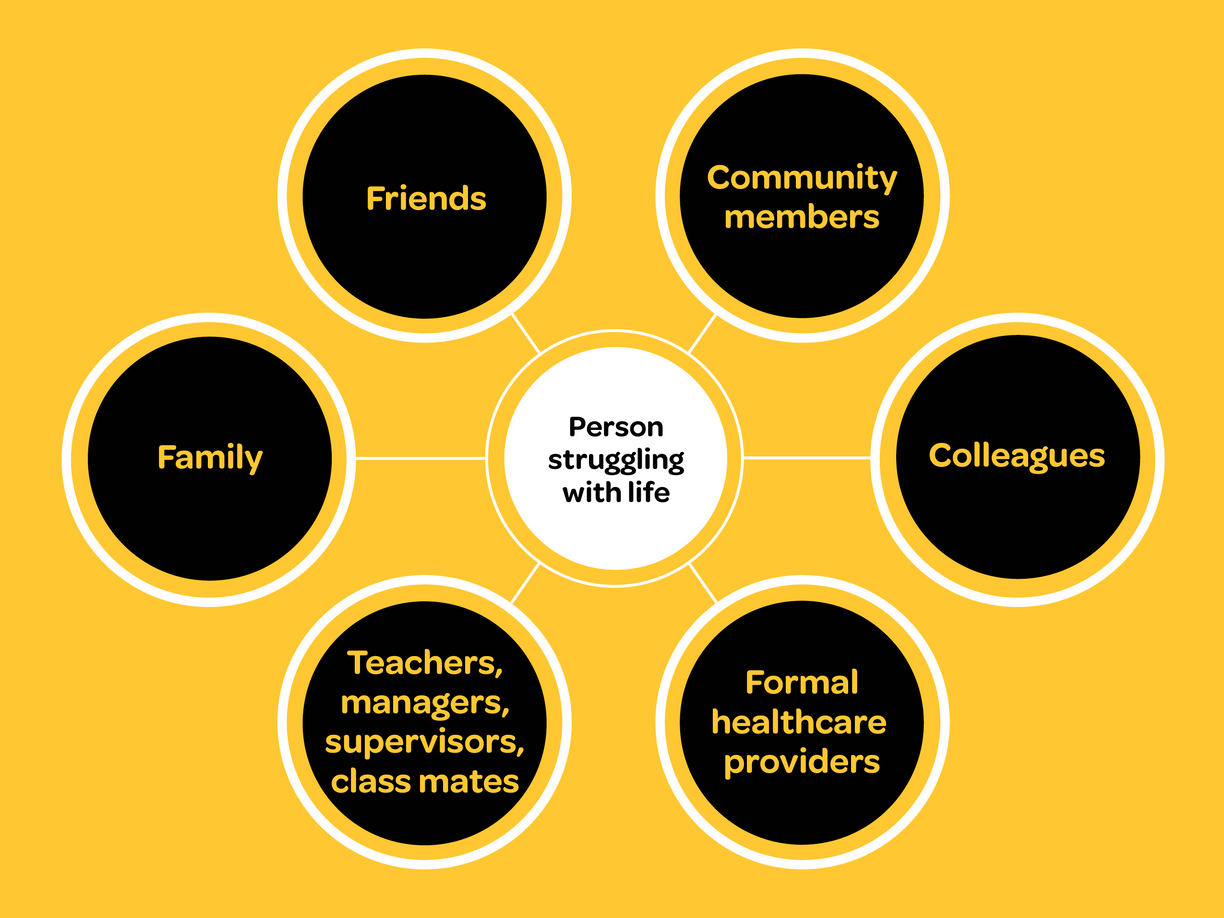
A CONVERSATION FOR ANY STAGE OF LIFE
Life's ups and downs happen to all of us. People can experience things like relationship breakdowns, financial difficulties, health issues or periods of major change at work, home or in life.
The people in your world won’t always tell you if something’s troubling them, so it’s important that you make asking, ‘are you OK?’ a part of your everyday relationships with friends, family, teammates and colleagues.
The earlier you give someone an opportunity to open up to you, the sooner they can find appropriate support or, if needed, professional help and the greater the chance that together, you can stop small problems from becoming bigger ones.
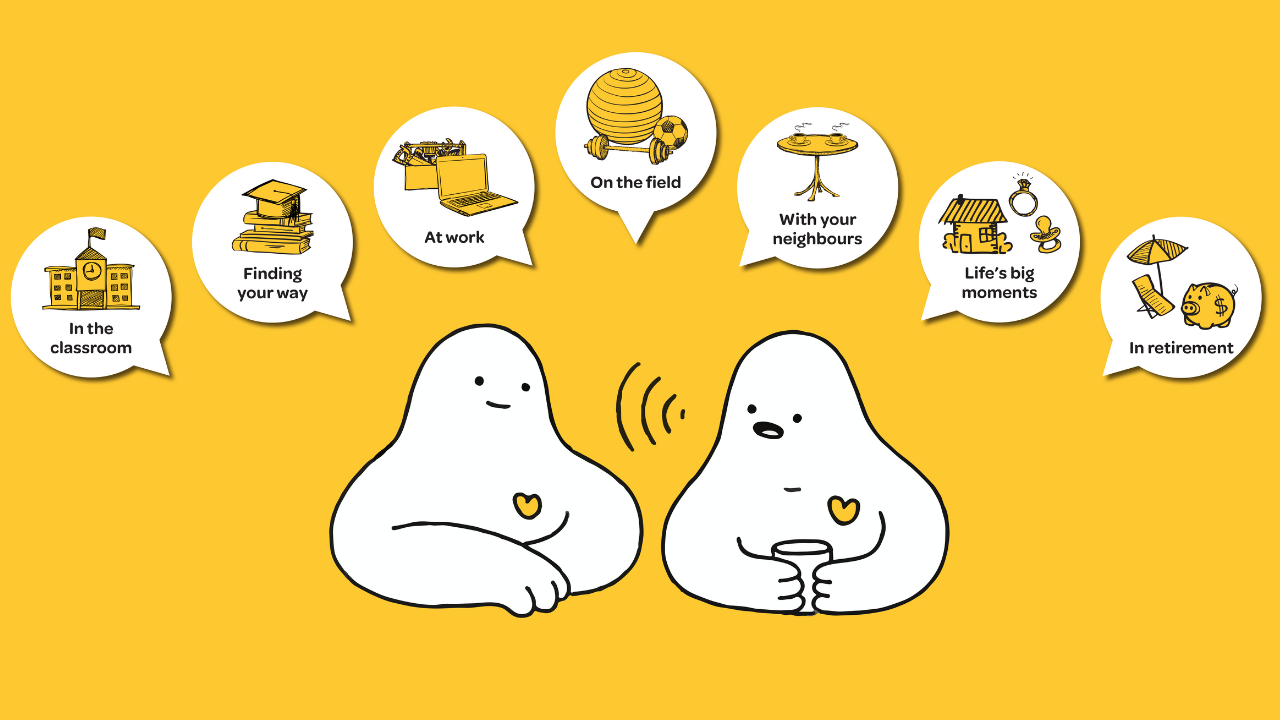
STATISTICS
8.8 people take their lives every day in Australia
Australian Bureau of Statistics. Causes of Death, Australia, 2023
An estimated 55,000 Australians make a suicide attempt every year
Over 10 million Australian adults know someone who has died by suicide
WHY IT'S IMPORTANT
CONTRIBUTING TO SUICIDE PREVENTION
We know that suicide prevention is an enormously complex and sensitive challenge the world over. One of the most well renowned theories behind preventing suicide is by Dr Thomas Joiner. 1
Following the suicide death of his father, Thomas has dedicated his research to try and answer the question, 'why?'. His theory tries to answer that complex question by describing three forces at play in someone at risk. One of these forces is a decreased sense of belonging.
It's this lack of belonging and sense of connection that we are working to prevent. By educating and encouraging people to take the time to ask, 'are you OK?' in a genuine authentic manner and listen to the reply with an open mind, we can help people struggling with life feel connected and supported long before they think about suicide. Social connections including regular, face-to-face, meaningful conversations about life, are a protective factor against suicide. Asking, 'are you OK?' is a great place to start. Learn How to Ask.
Our work is informed by many other experts in the field and contributes to an integrated nationwide approach to suicide prevention.
1 - Joiner, T.E. (2007) Why People Die By Suicide. Harvard University Press. USA.
HOW IT WORKS
Our research 1 has shown those who are exposed to the R U OK? campaign are up to six times more likely to reach out to someone who might be experiencing personal difficulties, compared to those not exposed to the campaign.
Those who are engaged with R U OK? are also more likely to 2:
- ask someone face-to-face if something was troubling them
- listen to someone talk about their problems
- refer someone who is troubled to a support service
Those on the receiving end of a meaningful R U OK? conversation report feeling supported, heard, safe and better about managing their situation having talked it through with someone who showed genuine interest and concern 3.
An overwhelming majority (90%) of people who are regularly asked R U OK? feel more supported, connected and cared about4.
1 Ross, A.M., Bassilios, B. (2019) Australian R U OK?Day campaign: improving helping beliefs, intentions and behaviours. Int J Ment Health Syst 13, 61
2 Verian (2023) R U OK? Impact Tracker, Australia
3 Fiftyfive5 (2023) R U OK?Day campaign research, Australia
4 Verian (2024) R U OK? Impact Tracker. Australia
WHERE WE FIT
R U OK? does not provide crisis support or counselling services.
We are a suicide prevention charity and registered public health promotion that aims to start life-changing conversations by encouraging and empowering Australians to reach out to friends, family members and colleagues who might be struggling with life's ups and downs, and ask, 'are you OK?'.
The work of health professionals is vital, and their value cannot be underestimated, however we can all play a role in supporting the people in our world.
When we genuinely ask, ‘are you OK?’ and are prepared to talk to them about how they’re feeling and what’s going on in their life, we can help someone who might be struggling feel connected and supported, long before they’re in crisis.
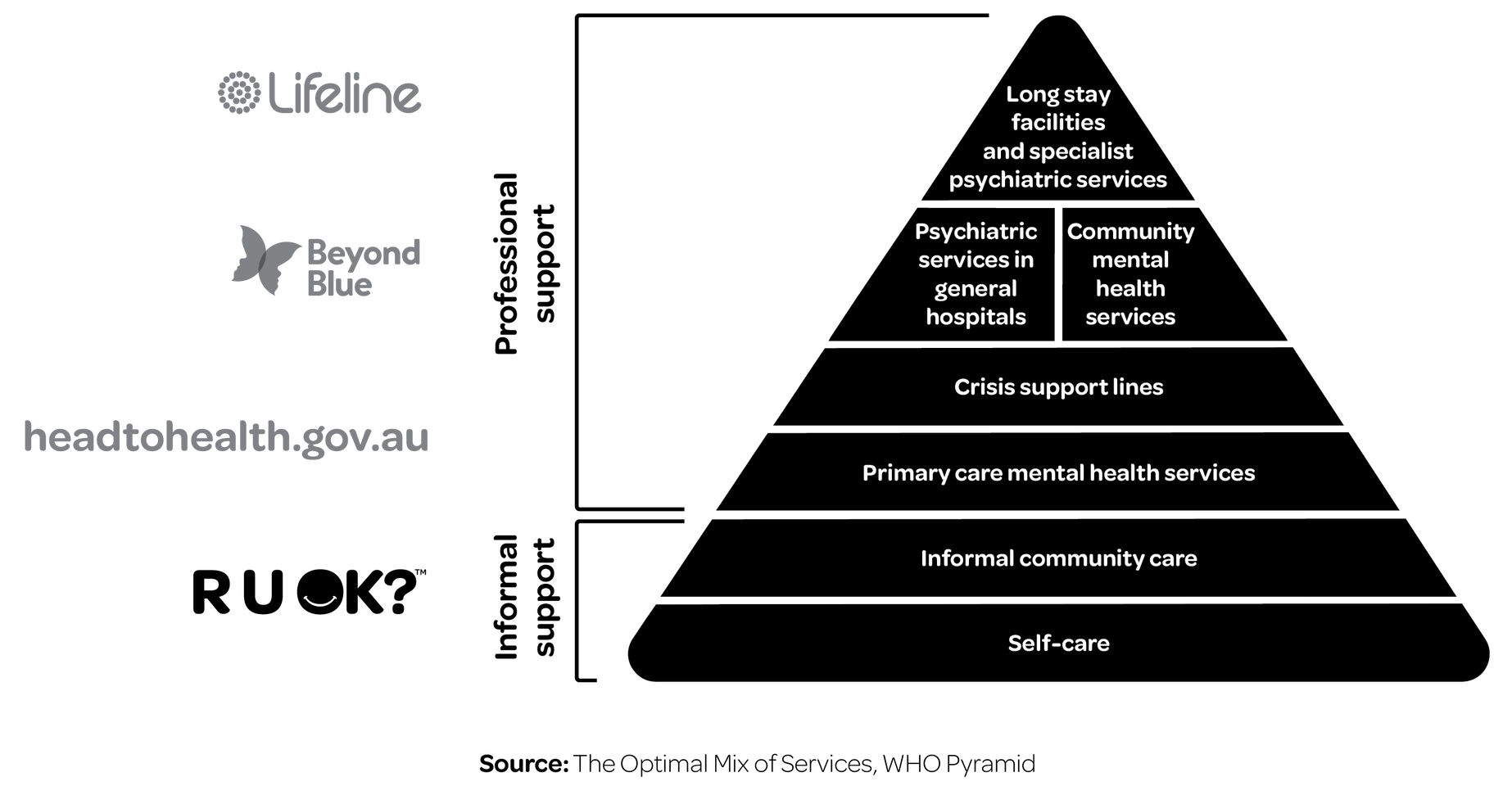
HOW WE SPEND FUNDS
R U OK? is predominantly funded by corporate sponsorships, community donations and the sale of R U OK? merchandise. Approximately 8% of our funding is from the Australian Government.
R U OK? delivers free resources that increase the willingness and confidence of all Australians to recognise the signs someone is struggling, start a genuine conversation and lend appropriate support.
R U OK? also tailors these resources to meet the needs of targeted population groups and settings.
These are some examples of our deliverables. You can learn more by clicking the button below.
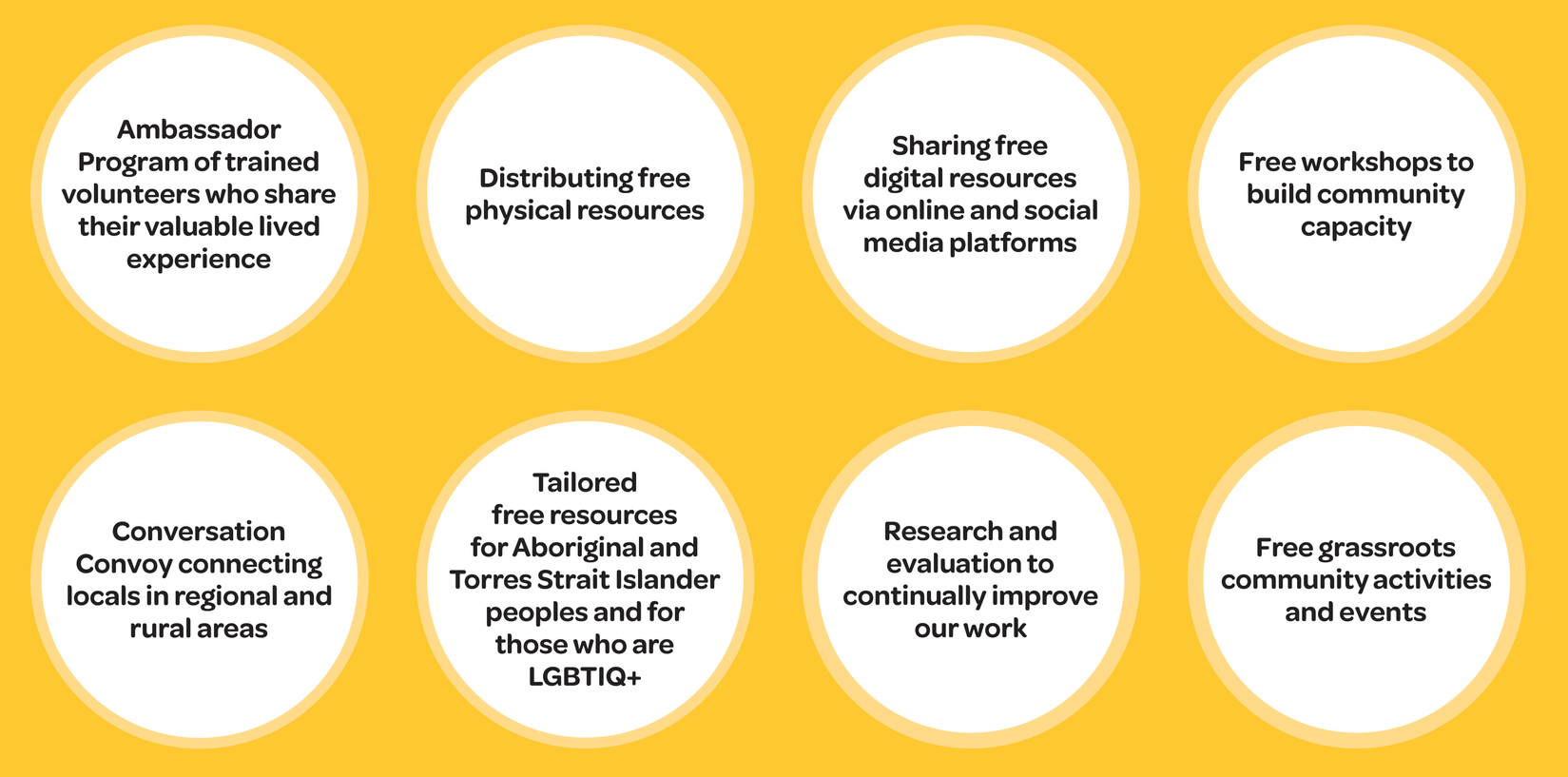
LIVED EXPERIENCE
R U OK? was born from lived experience. The valuable insights, storytelling, and expertise of those with lived experience continue to be woven through everything we do. Across our team, board, advisory groups and Community Ambassadors, we remain respectful and proud of those who share their stories. Their voices help us continually improve our work and foster connection and conversation in their communities.
At R U OK? we involve people with lived experience from the outset when developing programs, campaigns and resources. We also use storytelling to share how meaningful connection and conversations have positively impacted the lives of those with lived experience.
Why is lived experience important to R U OK?
Through telling their stories, people with lived experience encourage others to connect and inspire healing in their communities. Hearing from people with lived experience is vital in our work to ensure resources and campaigns are authentic, relevant and relate to people of all walks of life and their communities.
What is lived experience?
Suicide: We are referring to someone that has experienced or experiences thoughts of suicide or suicidal behaviours. We may be referring to someone that has attempted suicide in the past and is on their journey of recovery. We are also referring to people who may have cared for someone going through a suicidal crisis or is bereaved by suicide.
Mental health: We may be referring to someone who lives with a mental health diagnosis or has experienced challenges to their mental and emotional well-being. We may also be referring to anyone who has lived with, or cared for someone, experiencing mental ill-health, or is currently doing so.
OUR 2025-2029 STRATEGIC ROAD MAP
We have a big vision and getting there requires having a strategy to ensure our resources, activities and messaging are effective. This document is the strategic road map for our organisation for 2025-2029.
AUTHENTIC CONVERSATIONS
The R U OK? mission is to guide people on when and how to have a meaningful conversation with someone in their world who might be struggling.
To help us develop the most appropriate calls to action and resources, we want to do more to listen to the experiences of those on the receiving end of the question. We listen to and value the voices of those who are struggling and who might be asked, 'are you OK?' by someone they know.
We are committed to influencing positive behaviour change and helping to ensure R U OK? conversations are authentic and respectful.
In this video Phoebe Coupe shares with R U OK? CEO Katherine Newton her experience of an R U OK? conversation.



















